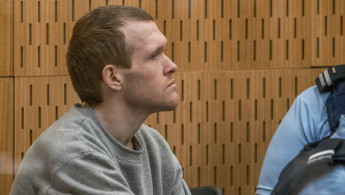Christchurch mosque gunman waives right to speak at sentencing
Tarrant, who sacked his lawyers last month, had admitted 51 charges of murder, 40 of attempted murder and one of terrorism over the attacks at the Al Noor and Linwood mosques in Christchurch on March 15 last year.
Defendants in New Zealand have the right to address the court and there had been speculation Tarrant would use his sentencing to promote his extremist views, leading to strict restrictions on media reporting the case.
But when judge Cameron Mander asked if he wanted to speak - after sitting through three days of anguished and angry testimonies from more than 90 survivors and bereaved families in which he was frequently called "a loser" and "a coward" - Tarrant declined.
A court-appointed lawyer will make a brief statement on his behalf before Mander delivers his sentence on Thursday.
The Australian white supremacist, 29, is expected to become the first person in New Zealand imprisoned for life without prospect of parole.
Shortly before waiving his right to speak, Tarrant was face-to-face with Abdul Aziz, who was hailed a hero when he chased the gunman from the Linwood mosque.
|
"I saw the fear in his eyes when he was running for his life," Aziz told the court.
"You know the face, the one who chased you out," he told Tarrant who sat a few metres away, maintaining the same passive demeanour he had shown throughout the three days of harrowing testimony.
'The fire awaits you'
When Tarrant opened fire through a window at the mosque, the 49-year-old Aziz grabbed a credit-card payment machine and ran outside, passing the bodies of an elderly couple, until he saw "this coward, gutless person" and threw the machine at him.
"Then he started shooting at me directly from three or four metres. I ducked in between the cars," he said.
"I went to the back car park and told him, 'Come here. You looking for me?' I didn't want him to go inside the mosque. At that time I knew I was going to lose my life."
But Tarrant ran to his car, allowing Aziz the chance to pick up a discarded rifle and throw it at the vehicle.
"When it smashed his side window I could see in his eyes he feared for his own life... you should thank God on that day I did not catch you," Aziz told Tarrant.
"You will never forget these two eyes you ran from."
Aden Diriye, the father of three-year-old Mucaad Ibrahim who was shot dead at close range by Tarrant, called the killer an "evil man" whose atrocity had failed in its goal to sow hatred and fear.
Diriye told Tarrant to "know that true justice is waiting for you in the next life and that will be far more severe (than prison). I will never forgive you for what you have done."
"You have killed my son and to me that is as though you have killed the whole of New Zealand."
"I will never forget how he would play in the mosque and make friends with every worshipper who attended, young and old. He was adored by all."
"Your atrocity and hatred did not turn out the way you expected. Instead it has united our Christchurch community, strengthened our faith, raised the honour of our families and brought our peaceful nation together."
'Rot in hell'
Hasmine Mohamedhosen, whose brother Mohamed was killed, called Tarrant the "son of a devil" who she wanted to "rot in hell between the four walls of your cell for eternity".
Ahad Nabi, whose father Haji Daoud Nabi was killed in Al Noor mosque, said Tarrant should never be allowed to walk free.
"While you are in prison you will come to realise that you are now in hell and only the fire awaits you," he said.
Mustafa Boztas, who was shot in the leg, likened Tarrant to "a rotten cloth that has been thrown away after dirty work."
"You are not even a human, not even an animal, since animals are beneficial to the world," he said.
John Milne, whose 14-year-old son Sayyad was murdered, said since the killings his mental health had suffered, leading to a spell in a psychiatric ward.
"There is a huge hole in my heart that will only heal when I meet Sayyad again in heaven," he said.
"I hope to see you there too, Brenton, and if you get the chance I'd love you to say sorry to Sayyad. I'm sure he's forgiven you too."
Agencies contributed to this report.
Follow us on Facebook, Twitter and Instagram to stay connected





 Follow the Middle East's top stories in English at The New Arab on Google News
Follow the Middle East's top stories in English at The New Arab on Google News
![Israeli forces ordered bombed Gaza's Jabalia, ordering residents to leave [Getty]](/sites/default/files/styles/image_330x185/public/2176418030.jpeg?h=a5f2f23a&itok=_YGZaP1z)

